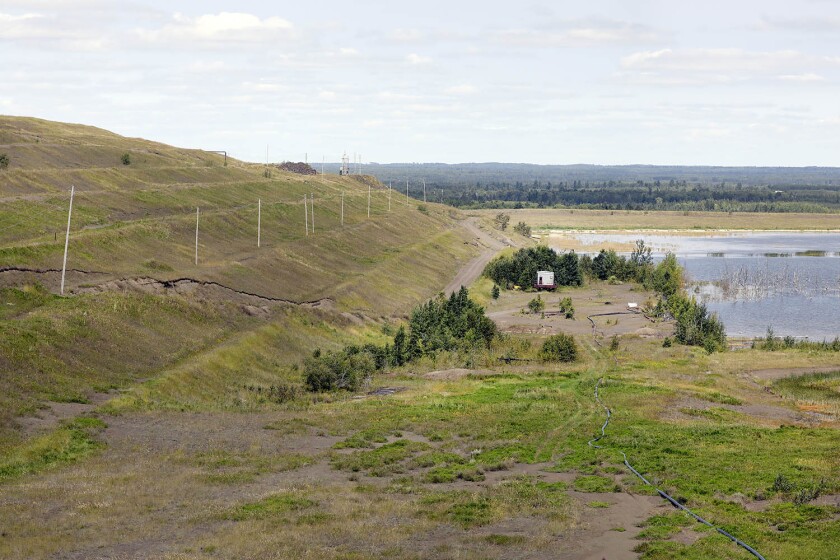The Minnesota Court of Appeals on Monday reversed key mining permits for PolyMet, the company trying to open the state's first copper-nickel mine.
In a 36-page decision released Monday morning , the court sent the dam safety permits and permit to mine awarded by the Minnesota Department of Natural Resource to PolyMet in late 2018 back to the DNR and said the agency must hold a contested case hearing, which would require an administrative law judge to examine additional evidence and testimony on the project. Then, with information from the contested-case hearing in hand, the DNR must decide whether to reissue the permits.
"The DNR’s decision to deny a contested-case hearing in relation to the NorthMet project was based on errors of law and unsupported by substantial evidence, and the DNR also erred by failing to include a definite term in the NorthMet permit to mine," Chief Judge Edward Cleary wrote in the decision. "For these reasons, we reverse the DNR’s decisions granting the permit to mine and dam-safety permits for the NorthMet project, and we remand for the DNR to hold a contested-case hearing."
The court suspended those permits in September after two post-permitting developments: Glencore took a 72% stake in PolyMet in June and a Vale tailings dam collapsed in Brazil in January , killing more than 200 people.
The court also said the DNR failed to set a definitive term for the permit to mine.
ADVERTISEMENT
"The DNR argues that 'nothing in the statute or rule (requires) a permit to have a fixed term.' We disagree," Cleary wrote. "The plain language of the statute expressly requires a 'term,' which is commonly understood as fixed period of time."
The DNR said it was reviewing the decision and noted it had 30 days to file an appeal to the Minnesota Supreme Court.
"We are carefully reviewing the court’s opinion, which has implications not only for this project but for the role of contested case hearings in the state’s permitting framework more broadly," the agency said. "Notably, the court’s opinion does not draw conclusions about the validity of the scientific analyses underlying the DNR’s decisions. We remain confident in the solid foundation of our technical work.”
In a news release, PolyMet said it remained committed to seeing the project through and was considering appealing Monday's decision to the Minnesota Supreme Court.
“We obviously are disappointed in the court’s decision. The administrative record for the NorthMet Project is built on a comprehensive process of scientific study, analysis and public review and comment established in state law, which we participated in for 15 years. We and the regulatory agencies have strictly followed that process," PolyMet said.
PolyMet would not comment on the delay's effect on financing the project. The company must still raise almost $1 billion to ready its open-pit mine, processing facility and tailings dam near Hoyt Lakes and Babbitt at the former LTV Steel Mining Co. site.
Opponents of the mine, who argue the project could send tainted runoff into the St. Louis River watershed and Lake Superior, urged the DNR to hold a contested-case hearing, but the agency denied one when it issued its permits in November 2018 .
The DNR denied the contested-case hearing because it said the project did not meet certain criteria: Is there a material dispute of fact in dispute? Is that issue within the DNR's jurisdictional? Would the contested case process bring forward more information and insight? And, the DNR said its commissioner ultimately had discretion on whether to order such a hearing.
ADVERTISEMENT
But the court called the DNR's interpretation "inconsistent with the language of the statue and the case law."
"Nothing in the statutory language grants the DNR the unfettered discretion it seeks to employ," Cleary wrote.
The court said environmental groups Minnesota Center for Environmental Advocacy and WaterLegacy had already identified "numerous factual issues" that would have justified a contested-case hearing before the DNR issued its permits:
- Whether an upstream construction of the tailings basin dam is unsafe.
- Whether the tailings basin's use of a bentonite line would actually work.
- Whether there is a better alternative to the planned "wet closure" tailings basin.
- Whether the financial assurance meant to reclaim the site when PolyMet closes, either as planned or unexpectedly, is sufficient.
- Whether Glencore, PolyMet's majority shareholder, should be added to PolyMet's permit to mine.
JT Haines, a spokesperson for the Minnesota Center for Environmental Advocacy, said the group is hoping facts will come to light through the contested-case hearing.
"We've been saying we need an evidentiary hearing on issues like the dam design and the idea of wet closure for years," Haines said. "Right now we're just glad that Minnesotans are finally going to have an opportunity to get the facts on these key issues."
Opponents of the mine were quick to celebrate the court's decision Monday.
“The Fond du Lac Band of Lake Superior Chippewa is pleased with the decision of the Court of Appeals, which recognizes that significant questions about the project’s design still remain," Fond du Lac Chairman Kevin Dupuis said in a news release. "The court’s decision validates the band’s concerns about the ability of the project to protect the environment, the public, and the band’s treaty resources."
Meanwhile, groups that support PolyMet, such as Jobs for Minnesotans, were disappointed in the court's decision. Supporters of PolyMet say the project will provide more than 300 jobs on the Iron Range and move the area's economy away from iron ore dependence.
ADVERTISEMENT
“We are deeply disappointed by today’s decision from the Minnesota Court of Appeals, which creates uncertainties for the PolyMet NorthMet project and consequently hundreds of jobs for northeast Minnesota," the group said in a statement. "While litigation is now an expected part of the regulatory review process and this ruling is a setback, we are confident that PolyMet will bring a safe and responsible copper-nickel mining industry to our state while also protecting the environment. "
The PolyMet project faces numerous other legal challenges.
Separately, PolyMet's national pollutant discharge elimination system, or NPDES, permit, which regulates water discharged from industrial activities, remains on hold after an August order by the Minnesota Court of Appeals after it was revealed the Minnesota Pollution Control Agency requested the Environmental Protection Agency refrain from commenting on a PolyMet draft water permit until the public comment period ended.
A hearing on the water permit is scheduled to start Jan. 21 and could last 5-10 days.
The Minnesota Court of appeals is also weighing PolyMet's air permits amid challenges by environmental groups that say the state agency failed to examine a report that showed the company was eyeing a mine almost four times larger than it had proposed in permit applications, and a decision on the air permits by April.
This story was updated at 3:11 p.m. with reaction and additional information from the court's opinion. It was originally posted at 10:30 a.m.








